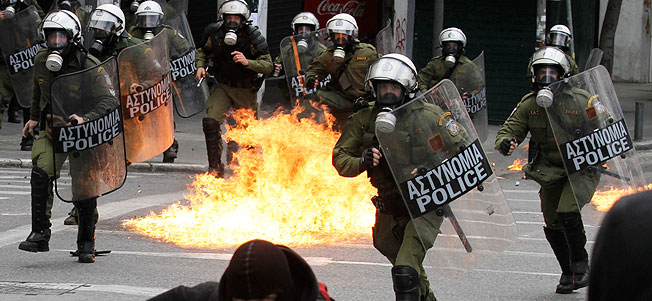
 AP – A motorcycle policeman burns as his colleague tries to help him after protesters threw a petrol bomb …
AP – A motorcycle policeman burns as his colleague tries to help him after protesters threw a petrol bomb …ATHENS, Greece – Youths wearing ski masks hurled chunks of marble and fire bombs at riot police as clashes broke out Wednesday in Athens during a mass rally against austerity measures, part of a general strike that crippled services and public transport around financially struggling Greece.
Police fired tear gas and flash grenades at protesters, blanketing parts of the city center in choking smoke and forcing thousands of peaceful demonstrators to scurry into side streets for cover. A motorcycle police officer was hit by a petrol bomb and his uniform caught fire in the city's main Syntagma Square, before he was rescued by colleagues. His bike was destroyed.
Protesters chanting "Don't obey the rich — Fight back!" marched to parliament as the city center was heavily policed. A brass band, tractors and cyclists joined the rally.
Rioting youths smashed paving slabs, marble building fronts and white marble balustrades outside central metro stations to use for hurling at police.
Some 15 policemen were injured, and nine suspected rioters were arrested, including a man who was allegedly armed with a longbow, arrows and an axe, police said.
The rally was part of Greece's first major labor protest this year as Prime Minister George Papandreou's Socialist government faces international pressure to make more lasting cuts after the nation's debt-crippled economy was rescued from bankruptcy by the European Union and the International Monetary Fund.
Police said some 33,000 protesters had attended the Athens rally. Organizers said the turnout was around 100,000.
Stathis Anestis, deputy leader of Greece's largest union, the GSEE, said a "small group of troublemakers" marred the otherwise peaceful protest.
"Unfortunately, some people don't want to understand that such behavior, intentionally or not, undermines workers' struggles and only serves the plans of governments, employers, and all those who want to take tough repressive measures against workers," Anestis said.
The sporadic clashes lasted for more than three hours. Several hundred protesters gathered outside parliament after the march and vowed to remain there until the government agreed to make concessions. They were eventually forcibly removed by riot police. Protest organizers at that gathering said they had been inspired by ongoing revolts in North Africa.
Prime Minister George Papandreou, on a visit to Finland, said he sympathized with the peaceful protesters.
"Economic situation (in Greece) is very difficult, and sometimes even I myself feel an urge to join the ranks of protesters," Papandreou was quoted as saying to Finnish national broadcaster YLE. "But mere protesting leads nowhere. We need decisions that can genuinely help fixing the problems."
The 24-hour strike halted trains, ferries and most public transport across the country, and led to the cancellation of more than 100 flights at Athens International Airport. The strike also closed the Acropolis and other major tourist sites.
State hospital doctors, ambulance drivers, pharmacists, lawyers and tax collectors joined school teachers, journalists and thousands of small businesses as more middle-class groups took part in the protest than have in the past. Athens' main shopping district was mostly empty, as most owners of small shops and cafes shuttered their stores.
Unions are angry at the ongoing austerity measures put in place by the Socialist government in exchange for a euro110 billion ($150 billion) bailout loan package from European countries and the IMF.
Greeks have endured months of pay and pension cuts, sales-tax hikes and other drastic spending reductions, but protests have been revived by longer-term reforms including involuntary transfers for civil servants and new market rules to end protective job practices for truckers, lawyers, pharmacists and others.
The GSEE's Anestis said workers should not be asked to make more sacrifices during a third straight year of recession and job losses.
"The measures forced on us by the agreement with our lenders are harsh and unfair. ... We are facing long-term austerity with high unemployment and destabilizing our social structure," Anestis told The Associated Press. "What is increasing is the level of anger and desperation ... If these harsh policies continue, so will we."
Elsewhere, about 15,000 people rallied and minor scuffles broke out in Greece's second largest city, Thessaloniki, while Anestis said around 60 demonstrations were held in cities and towns across Greece. He said the GSEE was in talks with European labor unions to try and coordinate future strikes with other EU countries.
Earlier this month, international debt monitors said Greece needed a "significant acceleration" of long-term reforms to avoid missing its economic targets. They also urged the Socialist government to embark on a euro50 billion ($68 billion) privatization program to pay for some of its mounting national debt that is set to exceed 150 percent of the GDP this year.
The IMF has said some of the frequent demonstrations against the Greek government's reforms were being carried out by groups angry at losing their "unfair advantages and privileges."
 Slideshow:Greeks protest austerity measures
Slideshow:Greeks protest austerity measures
___
AP Television's Theodora Tongas, AP writer Costas Kantouris in Thessaloniki and Jari Tanner in Tallinn, Estonia contributed to this report.
http://news.yahoo.com/s/ap/20110224/ap_on_bi_ge/eu_greece_financial_crisis
No comments:
Post a Comment